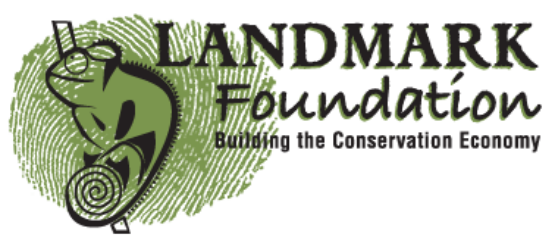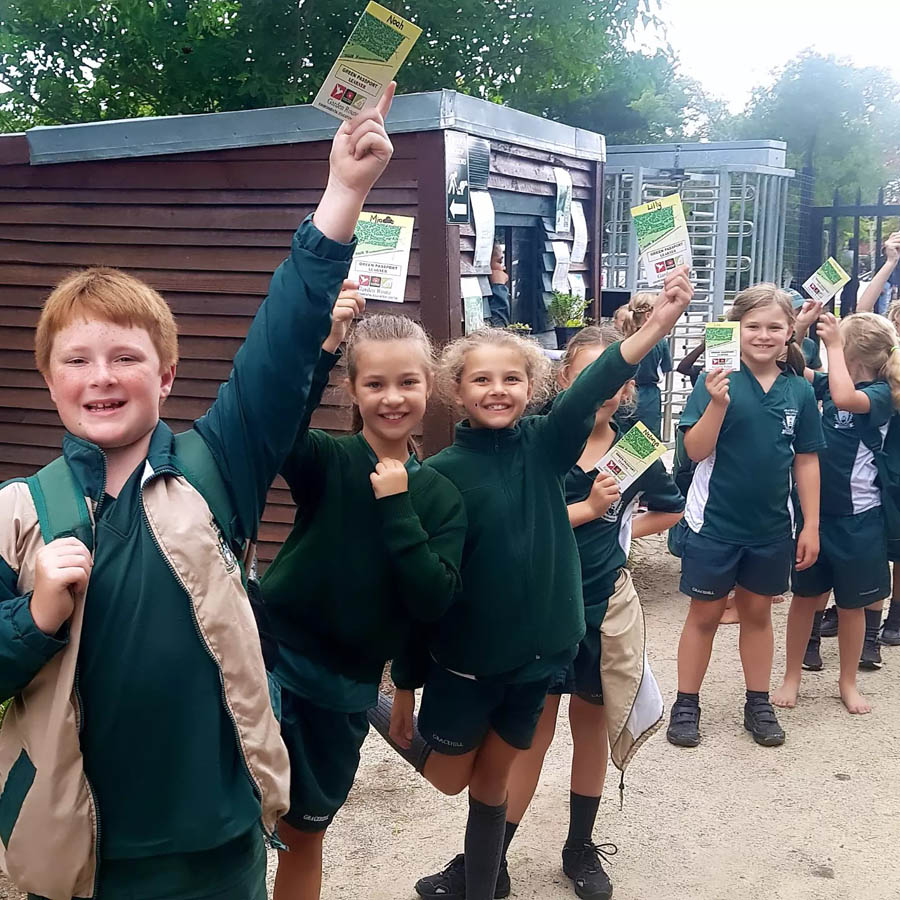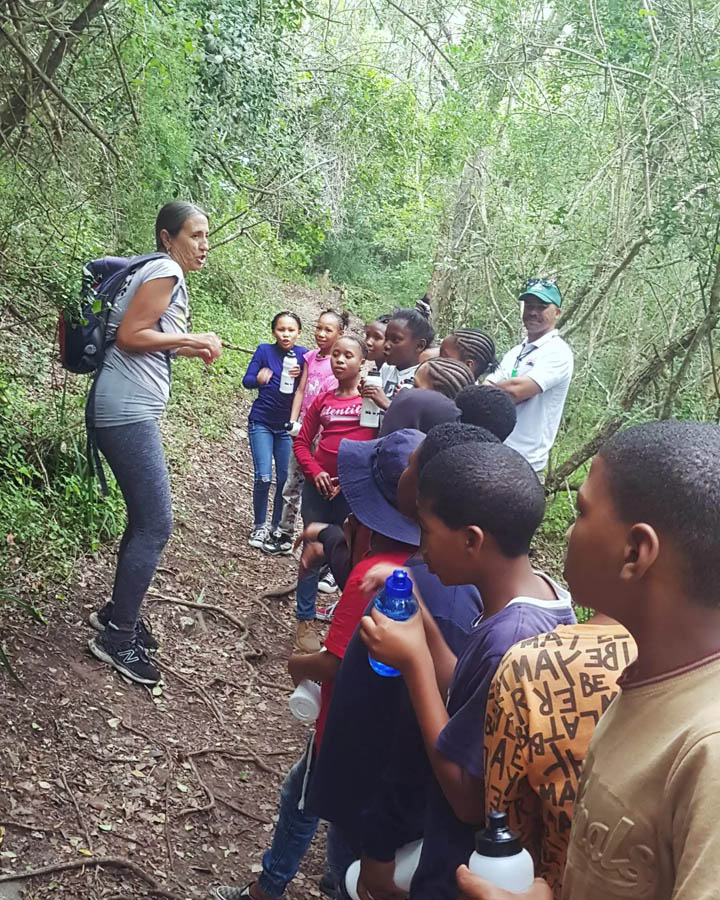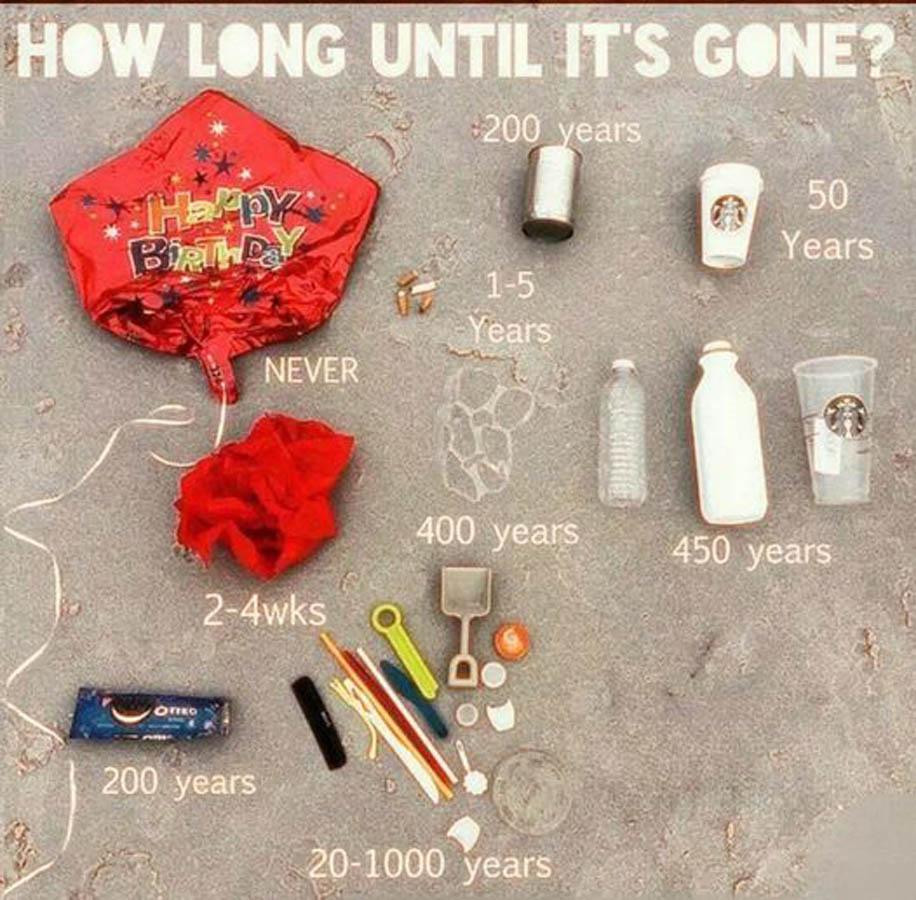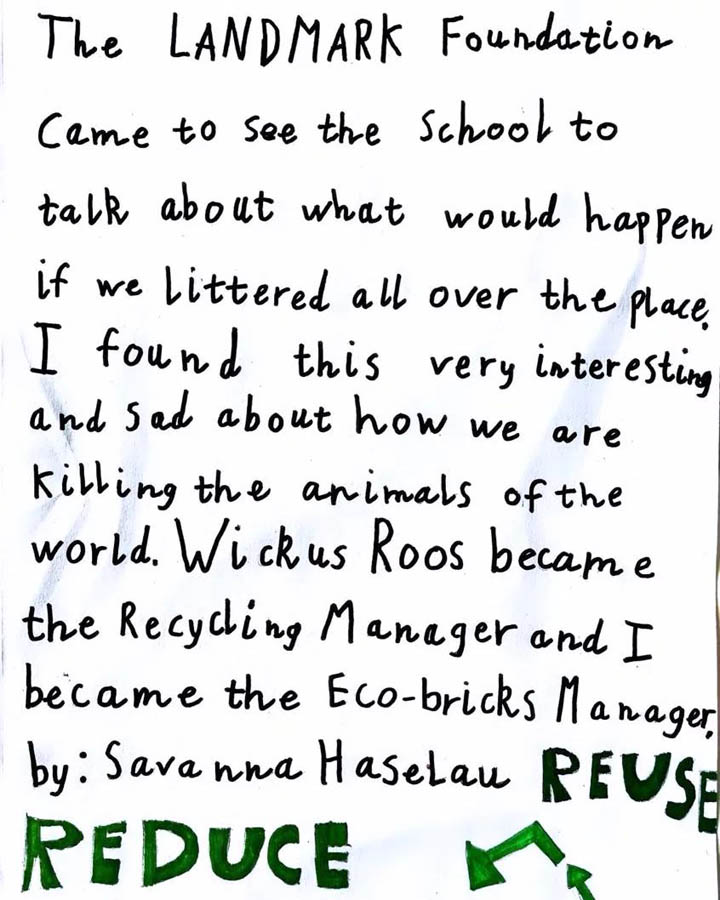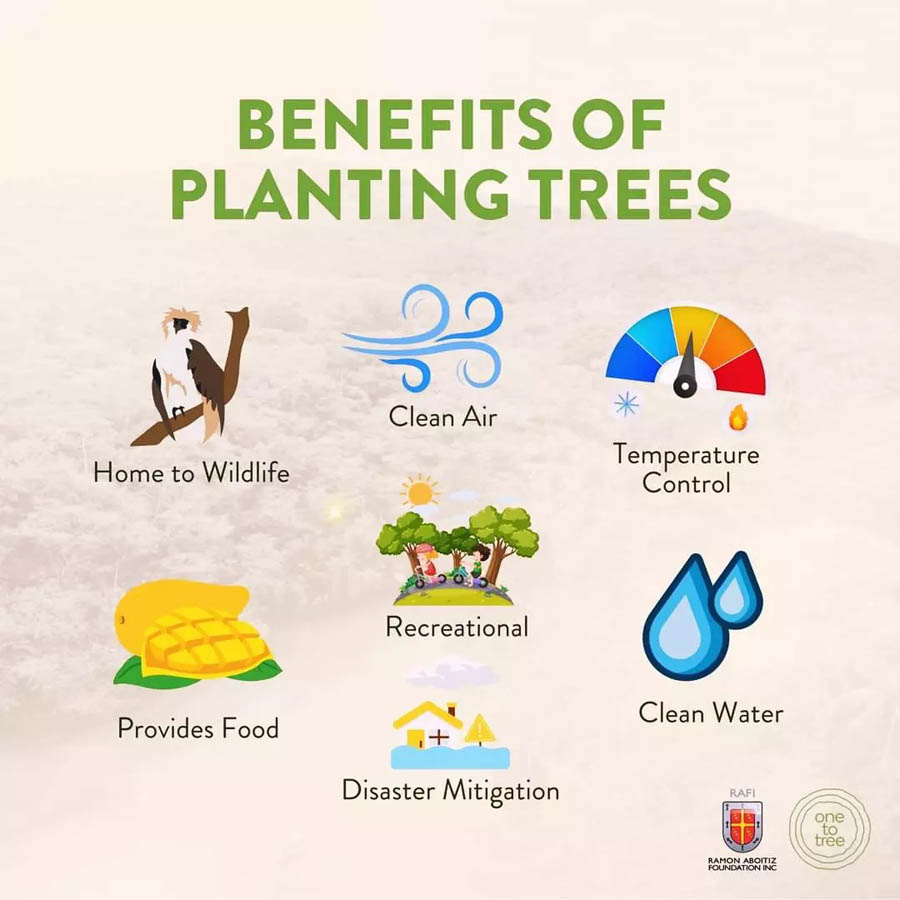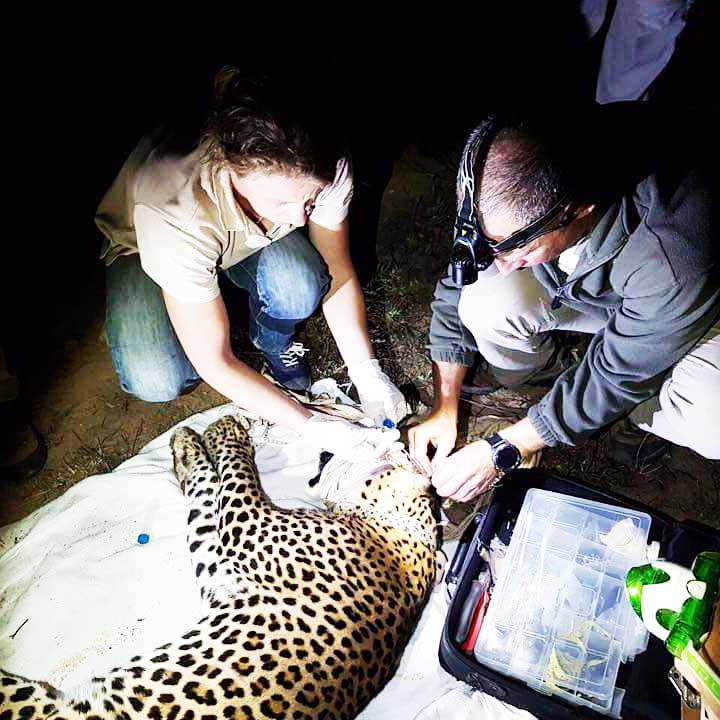
Environment Education
The need for environmental education is greater than ever as environmental crises escalate. Landmark Foundation continued our education efforts having interacted with 1139 scholars and 402 educators during 2023. We continue to engage learners through our four objectives of environmental education: developing values, attitudes, knowledge and skills to address environmental challenges and ecological well-being. To promote sustainable communities through education, we must transfer ecology-sustaining skills, impart relevant knowledge, change people’s attitudes, and instil much-needed values that promote a more caring world. These four objectives contribute to proper development of a less-entitled human consciousness.
Our environmental education programme remains focused on specific developmental stages: early childhood development and intermediate phase where we inspire interest in nature and ignite environmental activism, and the grade R to 12 phase where we convert knowledge into action by means of projects, outings and campaigns. Within the school sector, we focus on introducing Green Clubs, Green Schools, and environmental programmes at Early Childhood Development Centres.
We also are actively involved in mentoring youth and increasingly have seen the need to become more involved in adult education. Our interventions of youth in conservation has been predominantly based on training youth in developing skills for the education sector. We have established specific projects that are integrated with conservation efforts and have partnered with several conservation organisations, NGOs, government and parastatal entities, enabling us to share resources and providing more effective results. Conservation education efforts seemingly are not easily funded. Despite our limited resources, we were still able to achieve significant impact through these partnerships.
We developed and sustained existing partnerships, particularly the Western Cape Education Department on crèche and food-garden programmes for more sustained implementation, and greater reach. Existing partnerships in education were maintained with SANBI, Department of Forestry, Fisheries and Environment (DFFE), Breede-Gouritz Catchment Management Agency, Cape Nature, SANParks, Garden Route Botanical Garden, Nelson Mandela University-Saasveld, George Herald, WESSA (Eden Branch), George Municipality, Garden Route District Municipality, and recycling agent LGE Waste
The Future is in their hands
Focus on social media
During 2021 and 2022, Landmark Foundation developed a hands-on environmental app. This app was launched in April 2023 and can be download for free. Following the global drive to engage with communities on the major contributors to biodiversity loss and the effects on climate change, this app is based on mitigating climate change. The aim of the app is to engage families to reduce their footprint and become more sustainable in their way of life. This app can be done from the comfort of their homes by anchoring the key notes of change: Reduce – Reuse – Recycle (3Rs). The App can be downloaded and viewed at: https://app.letschange.earth/pledge
The App Icon Landmark Foundation maintains a strong presence on the social media platform, and our different actions are showcased through short videos, stories, reels and visual posts on Instagram and Facebook. Instagram.com/landmarkfoundationsa/ https://web.facebook.com/LandmarkFoundation/
Schools Programme
Landmark Foundation run several environmental programmes within various schools of the Western Cape. These are designed to target the individuals in schools with a flair and passion for leadership and interest in the environment. It is intensive and dedicated to a small group of learners within a specific school structure, although the impacts reach the entire school community.
Green Clubs
The key components of the Green Club programmes are to develop environmental leaders, to ignite a drive for activism, to bring awareness of global issues, to promote science-based knowledge, to spread awareness to the parent community, to transfer the skills of running campaigns, to manage projects, and to inspire a deeper love for nature. Pupils in the school garden The Green Club programme is entirely reliant on internal champions to sustain itself, especially teacher champions. The weakness in the programme is the lack of enthusiasm in the teacher groups, and thus sustained champion action. This resulted in our efforts with the Western Cape Education Department in 2023 in focusing on training educators. Several attempts to establish these clubs in a range of schools seem to fail due to teacher changes and pervasive apathy towards environmental concerns. However, Glenwood House has been an enthusiastic partner for almost 15 years. There is a real need for willing teachers/head teachers to continue to register new schools and follow through with the program. We have two very active Green Clubs presently through Glenwood House School:
- Glenwood Greens – 26 learners at Glenwood House Preparatory (Grade 5, 6 and 7’s) – influence 380 scholars.
- Glenwood Environment Society (GWES) – 23 learners at Glenwood House College (Grade 8 to 12) – Influence 460 scholars.
Landmark Foundation is also developing a Green Clubs manual to assist schools with establishing and implementing these. Green Schools – A recycling program Run in collaboration with George municipality, LGE Waste (Waste-recycling agents in George) and Garden Route District Municipality, this project aims to introduce waste management to the respective schools by implementing a simple recycling system that is easy for learners and educators to use and can render financial rewards for the school, thus promoting the green circular economy. LGE Waste facilitates the compensation system where the school is paid for their paper and tin collections.
Youth at the LGE Waste Centre
This project is a practical way of getting schools to recycle without the implementation of the Green Club programme, which can be intensive to run without a dedicated champion teacher. In the primary school sector, we focus on the grade 6 and 7 that manage the recycling program. In high school, the grade 8’s in association with the grade 11’s run and manage the recycling program. This allows a sense of ownership of the project and doesn’t become a burden to teachers or the school. This program has been effective in reducing waste to landfill and it has a knock-on effect on the learners’ families and households. At the end of every year the school receives a certificate of recognition for their environmental and social efforts during the year. In 2023, Glenwood House Preparatory and College and Gracehill College are still on board and continue to maintain a recycling system in operation.
Creches Project – Early Childhood Development Centres
The Crèches Project is specific to the early childhood development (ECD). It aims to introduce environmental education to young pupils, by linking it up with the curriculum in a way that is simplistic and yet impactful.
The key focus is to introduce the concept of “Reduce- Reuse and Recycle” at a very young age, to promote a modest simple way of living. The 3Rs concept encourages care, compassion and awareness of the living space around us. In Phase 1, the learners are fully involved in setting up a waste separation system at the school.
The separation process gives birth to the use of organic material and the value of composting at the school. In Phase 2, the learners used this compost in the creche food gardens, where they learn about seed planting, recycling, etc.
We encourage the provision of one hearty meal to the ECD scholars from this produce, but this too requires commitment from educators and facilities for such that is resource dependent. In addition, a valuable amount of plastic and paper brings a favourable income for the school. Therefore, the whole community gets involved in collecting and recycling.
This program also aims to instil new habits and influence families and communities. We collaborate with the Department of Social Development ECD division, George Municipality, Eden District Municipality, as well as LGE Waste. Unfortunately, only 2 of the 12 registered creches of 2022 continue to be committed and have proven that the system works. However, we had a new registration this year: George Voorbereiding. They are the blueprint of how this program can work and be effective.
More resources will enable a more concerted and sustained capacity drive in this valuable programme. A school champion must lead this program and there must be a complete buy-in from the principal and staff. Our drawback once again is staff capacity, so we monitor and give the schools support on a regular basis.
Landmark Foundation is also currently developing a cheches’ manual so that this model can be used for crèches willing to join the initiative. We also aim to engage with WCED in Garden Route in order to implement this program at a higher level.
The reduction to landfills has been very impactful and the schools also have financial gain from projects, such as the TIN CAN PROJECT and the BOTTLE TOP PROJECT, as well as remuneration for paper – a project run in partnership with LGE Waste, George Municipality and Garden Route District Municipality. Food Garden Community Project
We continue to be involved with “KOS en FYNBOS”, a community-driven food garden initiated in 2015. Although it is goes through varying periods of activity based on the champions’ involvement, there is a large following on a WhatsApp group where members can share gardening information, and ask questions about environmental awareness, climate change issues, and so on. This is a groundswell movement, Landmark Foundation continues to facilitate the spreading of conservation awareness.
Following permaculture principles and the core value of the “No Dig Food Garden” method, as it is water-retentive and promotes the regeneration of the soil through mulching. The method is cost-effective and requires minimal resources to set it up. The materials needed are manure, dry grass, newspaper and cardboard. We have one example of a sustained Food Garden. For the past four years, we have continuously supported one community garden situated in a very impoverished area of George. Inherited from his late brother, Rodwell run this garden, an is getting closer to achieving his dream: starting a Saturday market and a coffee canteen where he can sell hot beverages and other homemade delicacies on site.
Other Youth Education Programmes
Oakdale Agricultural School
This partnership has deep value to us and has been running since 2012. Annually, this conservation project takes out the Life Sciences Grade 10’s on a three-day long camp where the learners are exposed to ecology, zoology, sustainable production impacts and enjoying being in nature. In 2023, we returned to the Grootvadersbosch Nature Reserve along the Langberg Mountains. We get an opportunity to engage with learners who are in an agricultural environment and will likely enter the farming industry.
The course is linked to the high school curriculum and includes leopard conservation, wildlife monitoring, climate change, ecosystems, biodiversity, soil and veld restoration, livestock husbandry, and sustainability. Learners receive a Conservation Certificate for this course.
Glenwood House Preparatory – Grade 2 Natural Science Curriculum Segment
We took all the Grade 2 pupils from Glenwood House over a period of three days on a explorative tour of the Garden Route Botanical Garden. We spent the day observing and discussing ecosystems, habitats, food chains, biomes and biodiversity, etc. The learners had an excellent knowledge base which was applied and understood in the natural world. This was a huge success, and Glenwood would like to make this part of their annual practical.
Gracehill College Environmental Program – Whole School – Grade 1 to 7
Gracehill College encourage outdoor experiential learning. We facilitate an environmental program for the school regularly. The Garden Route Botanical Garden is a perfect setting and space to bring learners closer to nature and expose them to the natural world. We link their outings to the curriculum and expand their knowledge and understanding of their environment and nature. This interaction will continue to grow as the school becomes more involved in green activities. This year, we facilitated spring day with the pre-primary classes and their parents. Throughout the morning, we organised a seed planting event and encouraged the parents to instil the values of the 3Rs to their children and the value of igniting the ecological intelligence that exists innately in humans.
Garden Route Environmental Education Centre (GREEC) – Garden Route Botanical Garden (GRBG)
Landmark Foundation has over the past six years developed several education programs for the GREEC. The programs are designed to encourage learners to develop observation skills as well as critical thinking and problem-solving skills specifically focused on natural environments, something we call “ecological intelligence”. The programs range from grades 1 to 12. One of the anchor programs Landmark Foundation developed is the Green Passports which encourage the learners to engage in observing the natural world and to enhance their ecological intelligence. Currently, there is no Environmental Officer at the GREEC to run these programs, so Landmark Foundation will continue to facilitate the groups for the EEC including green passports. The green passports have been completed by all the schools that visited the gardens this year.
Public (adult-focused) Education and Awareness Project
Waste is a major contributor to pollution and a growing factor in the combat against climate change. Landmark Foundation identified a crucial missing element to recycling in George. Most people have no idea what goes into recycling bags, it is confusing to most and it seems very complicated, so we developed a recycling chart (poster) for the recycling agent in George and for George Municipality. This will have a reach of 250 000 residents, businesses, schools etc with the distribution of this through the municipal communication system.
Plastic Recycling Chart Developed by Landmark Foundation in 2022 and distributed in 2023.
Recycling Project TIN CAN collection project for schools in partnership with LGE Waste. Schools can sell their tins and cans and generate funds for the school. This project continues to run throughout George.
Bottle Tops and Bread Tags collection was also developed for schools and the public. This project is done in collaboration with LGE Waste and Sweatheart Foundation. Schools collect bottle tops and hand them in for weighing at LGE waste. Once the target weight of 450kg is reached LGE waste donates a wheelchair to someone in the community. The schools can elect the recipient. In 2023/2024 year, we were able to facilitate the donation of two wheelchairs.
Arbor Week/Month
We facilitated a community tree planning event in Pacaltsdorp. The trees were donated by George Municipality. This event secured a partnership with the Pacaltsdorp community, and we look forward to continuing to work with them. City Nature Challenge 2023 Together with The Eden branch of WESSA we facilitated walks through the Garden Route Dam during the four days of the CNC 2023. The aim was to encourage locals to participate in this global project run by Natural History Museum, California, and organized in South Africa by SANBI. We chose the Garden Route Dam to initiate data recording of fauna and flora for future reference.
Touwsriver Revival – A rehabilitation and tree-planting event
A section of land between two indigenous forests on the Touwsriver was identified for rehabilitation on the dune and connect the two forests owned by SANParks. Local groups, NGOs and interested parties joined in a massive collaboration to contribute to resources, knowledge, and expertise from the area. The partners included SANParks, DFFE, Kaalvoet Consulting,
The Lady of the Herbs, Tree whisperer, Garden Roots, Into the Wilderness, Wilderness Ratepayers Association, Touwsriver Conservancy, FINREL, Indalo Harmony and Botanical Society of South Africa. Everyone in the community was invited to join in for a full planting day event. This rehabilitation of the Touws River is an ongoing project.
Natural Resource Users (NRU) Project – A skills development and capacity building project
In an attempt to find solutions to natural resource harvesting in indigenous forests (inclusive of bark stripping), we partnered up with Cape Nature and George Municipality to create an information-based education program. The aim of this project is to create awareness around the value of natural resources and the importance of a sustainable future for our vulnerable natural indigenous vegetation. We engaged with the traditional healers, herbalists and medicine people of our area, to allow a dialogue and open discussions and invite them to be part of the solutions and empower them to be more ecologically informed about the impact of harvesting unsustainably.
Kids in the Park – A SANParks-organised education program
Annually, SANParks run the Kids in the Park programme at one of their national parks. In 2023, Ebb and Flow was awarded the opportunity to host it once again. This is a highly impactful education program where grade 6 and 7 learners spend 2 nights and 3 days immersed in nature. During their stay, the learners attend several workshops and courses presented by Cape Nature, NSRI, Working on Fire, SANParks and Landmark Foundation. Landmark Foundation takes them on a journey of exploration through the forest, enhancing observation skills and ecological intelligence, as well as teaching them the 3Rs principle as a tool to mitigate climate change. During five consecutive weeks, this program supervises 500 hundred learners and 20 educators.
Malgas Revival Project – Capacity building and skills development education program
Landmark was invited to collaborate in a capacity-building and skills development program. The project initiated by SANBI and DFFE aims to engage with local schools for a day of environmental education. With the education structure provided by Landmark Foundation, the learners received information about basic alien tree identification and removal, basic indigenous tree identification, and river health assessment by members of the Garden Roots, Kaalvoet Consulting, Tree Whisperer, Lady of the Herbs, and Breede-Gouritz CMA. Umkhondo Big 5 Wildlife Education & Wildlife Forensics Academy Programme for Young Professionals
We have participated in an educational programme for aspirant wildlife professionals and veterinarians in training. At least 70 participants have been exposed to this training that involved human-wildlife management aspects, ecological research and rewilding efforts. Umkhondo Big 5 Wildlife Education Students from Denmark
Table 5. Summary of the environmental educational actions in 2023.
| School/Organisation | Program | Period | Total learners | Total educators | Target grades/ages |
| Glenwood House | Green club | Ongoing (weekly) | 23 | 1 | 8 to 12 years-old |
| Glenwood Primary | Green club | Ongoing (weekly) | 26 | 2 | 5 to 7 years-old |
| Gracehill College | Green school recycling program | Ongoing | 112 | 7 | Grades 1 to 7 |
| George Voorbereiding | Creches project | Ongoing | 280 | 10 | Grade R |
| Klouter Kabouter | Creches project | Ongoing | 50 | 6 | Grade 000 to R |
| Glenwood Pre-Primary | Creches project | Ongoing | 60 | 8 | Grade 000 to R |
| Arbor Week | Arbor Week | Ongoing (one week a year) | 12 | Adults | |
| Rowdel Rosedal | Food garden | Ongoing (two days a year) | 5 | All ages from 23 | |
| Oakdale Agri School | Conservation Education | Ongoing (three days a year) | 16 | 3 | Grade 10 |
| Green Passports EE Tours | EEC | Ongoing | 305 | 5 | Grades 4 to 10 |
| Youth | Youth conservation | Ongoing | 8 | All age from 20 | |
| Malgas Revival | Capacity building | Ongoing | 20 | 15 | Grade 5 to 6 |
| Touwsriver Revival | Public awareness | Ongoing | 30 | 200 | Public event |
| Glenwood Primary | Life Science EE | Once off | 60 | 6 | Grade 2 |
| Gracehill College | Environmental education | Ongoing | 135 | 6 | Grade 1 to 7 |
| Natural Resources Users | Adult education | Ongoing | 30 | Adults from local communities | |
| City Nature Challenge | Environmental Public Forum | Once off (four days) | 300 | Open reach to George and its surrounding |
Wildlife Welfare and Wellbeing Manual
In collaboration with Karen Trendler of Working Wild we are facilitating the compilation of the welfare manual and guide related to wildlife management. This manual will be completed in 2024. Education Projects in 2024 The last three years have seen our resources under pressure that limited the reach of our education work. Regardless, we have achieved a great deal. Given the right opportunity and more resources, we can achieve major changes in our community. We would like to continue:
- To initiate talks with WCED in developing an Early Childhood Development program in schools that will include Environmental Education. It would basically mean that we would implement the Creches Project on a provincial level and get more participation and commitment from educators.
- To increase the number of Green Clubs in schools by targeting at least 4 schools a year. This equates to less waste to landfills and more environmental ambassadors.
- To publish Farmers’, Creches’ and Green Club’s Manuals as a guide to educators and participant facilities.
Collaborations and Partnerships in Education
Landmark Foundation has built strong relationships with other NGOs and organizations in the environmental education field. These partnerships facilitate achieving more impactful results.
Collaborating Organisations
- Cape Nature Conservation – Various Projects and Collaborations
- SANParks – Environmental
- Garden Route Botanical Garden – Environmental Education
- Nelson Mandela University, Saasveld – Interns
- George Herald – Environmental awareness – Tree Committee
- WESSA EDEN – Support with various projects and collaborations
- George Municipality – Support with Green schools
- Garden Route District Municipality – Support with recycling and waste
- LGE Waste – George Waste Recycling Agents support recycling and various projects with schools. Major role players in minimizing waste to landfill and generating green economy opportunities.
- Kaelvoet Consulting – Restoration, rehabilitation and education.
- SANBI
- DFFE
“True change is the change that comes from within. Our role is to change people’s and children’s attitudes toward the environment. In some cases, we assist with furthering conservation efforts and in others with initiating an understanding for the natural world. There are many ways to create change; passion and strong leadership are key elements. We strive to be resourceful, streamlined and not wasteful in any of the projects we initiate. The process is an important factor in achieving long-term change. This requires time. Our coined phrase being: “ONE BITE AT A TIME” and “YES WE CAN”. Monica Vaccaro, Education Coordinator – Landmark Foundation
Environment Education Photo Gallery
Latest News
CONTACT US
Jeannine 0833243344
Bool 0845924099
E-Mail:
jeannine@landmarkfoundation.org.za
Find us on Facebook
Find us on Instagram
Follow us on X (Twitter)

